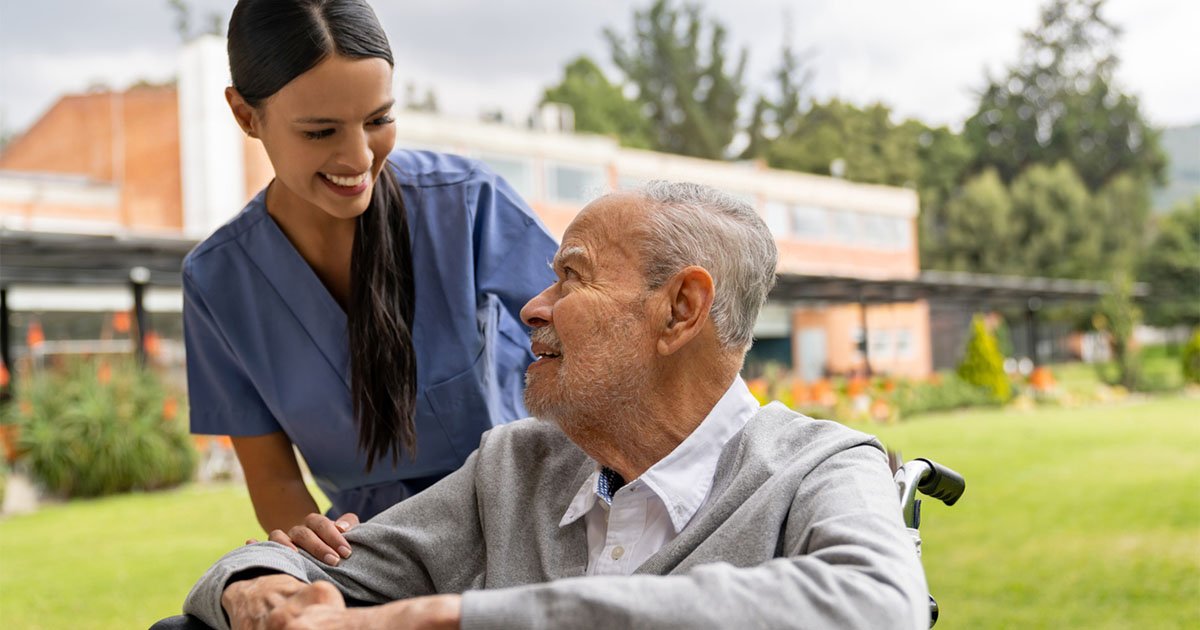As Americans live longer and healthier lives, the demand for nursing care is increasing as the capacity to provide that care is shrinking — especially in rural areas. Experts across the University of Minnesota System are working to find creative solutions to ensure Minnesotans can all thrive as we age.

Rajean Moone, who is also faculty director of Long Term Care Administration in the College of Continuing and Professional Studies on the Twin Cities campus, and Lacey Loomer, associate professor of Health Care Management in the Labovitz School of Business and Economics on the Duluth campus, answer questions about the future of long-term care in Minnesota.
Q: Why is the demand for nursing care increasing in Minnesota?
Moone: We are in the midst of a demographic shift in our state as we all age and live longer lives. Today a 10-year-old has a 50% chance of living to at least 104 years old! This is an exciting phenomenon that poses both opportunities and challenges. Not only are we living longer, but our families are changing too, with more Minnesotans aging alone. This demographic trend is the primary driver in more people seeking skilled nursing care when they need it, now and over the next several decades.
Loomer: The longer we live the more likely we are to be diagnosed with chronic diseases such as Alzheimer’s disease and related dementias. In Minnesota, 101,000 people are currently diagnosed with Alzheimer’s disease. This population is more likely to need long-term services and support. Many of us do not like to think about the fact that we are getting older and may need services in the future, but 70% of people 65 years and older will require skilled nursing at some point.
Q: Is our workforce ready to meet this demand?
Moone: Unfortunately our senior care sector is experiencing significant challenges in both recruiting and retaining a skilled workforce. The same demographic shift showing an increase in older adults, shows a decrease in working-age Minnesotans. Economic factors such as low wages and poor benefits for nursing home employees contribute to this shortage. The workforce shortage was only exacerbated by the COVID-19 pandemic, which increased stress and burnout in nursing homes across the state. We are working to develop innovative solutions and programs to support the long-term care workforce.

Loomer: In addition to the patient-facing workforce, we also need to consider all facets of the business community that interact with older adults. Ensuring local businesses and communities are age-friendly is important for ensuring equitable access for our aging population. Although many students do not receive formal education on the impacts of aging, the University of Minnesota Twin Cities and Duluth campuses are age-friendly University campuses that offer new opportunities for our students to learn about ageism and the impact of aging.
Q: How does an aging demographic impact local communities?
Moone: Minnesota is and has always been a great place to live and age well. We offer robust long-term services and support designed to help people age in place and, when needed, receive high-quality long-term care in assisted living communities and nursing homes. At the same time, communities across the state experience different access to services when and where they need them. This could include waiting lists or the need to travel long distances to find a nursing home.
Loomer: Rural counties have 41% fewer nursing home beds than twenty years ago. Due to rapidly aging rural populations, the demand for nursing home beds is predicted to peak sooner in rural communities than urban communities. We need to think broadly about increasing equitable access to long-term services and support. These areas may need more resources than they currently have access to in order to support preferences for aging in place.
Q: What can Minnesotans do to prepare to age well?
Moone: We can plan. Whether it is financial, legal or personal planning, we can work to ensure we have the resources and support needed as we age. If available to us, we can purchase long-term care insurance or explore other financial programs that can help increase choice later in life. We can also explore healthcare-related preferences — wants and needs — and share these with those around us and our healthcare provider. Tools such as a healthcare directive can help a person think about and document future care needs.
Loomer: There are tools to help you with that planning including the Senior LinkAge Line, a free statewide service that is a collaboration between the Minnesota Board on Aging and Minnesota’s area agencies on aging. There are several publicly available consumer report cards such as the Minnesota Nursing Home Report Card and the Minnesota Assisted Living Report Card that aggregate information from health inspections, quality of life surveys and patient assessments to provide easy to understand information on the quality of care facilities across the state.
Q: How is the University of Minnesota working to address the needs of older adults in all parts of the state?
Moone: The University of Minnesota established one of the first long-term care administration programs in the nation back in 1972. Since then, the Twin Cities campus program expanded to include: a series for working professionals who want to advance their careers, a minor for undergraduate students, a certificate, graduate courses, the only university-affiliated assisted living course in the state, and our partnership across campuses. Our goal has not wavered in over 50 years: to educate students to lead complex healthcare organizations and improve the quality of care and life for all of us as we age.
Loomer: At the Labovitz School of Business and Economics on the Duluth campus, we have a robust healthcare management program that is certified by the Association of University Programs in Health Administration. Our healthcare management program attracts students who go on to work in all areas of healthcare, including hospitals, clinics, insurance and government. We partner with the University’s long-term care administration program so students interested in obtaining licensure to become a nursing home or assisted living administrator can complete fewer courses and graduate with both a general healthcare management bachelor’s degree and a specialized focus in long-term care administration.
Rajean Moone is the faculty director for long-term care administration in the College of Continuing and Professional Studies at the University of Minnesota. He serves as the associate director of policy for the Center for Healthy Aging and Innovation in the School of Public Health. Moone’s experience includes working at the Minnesota state unit on aging and area agencies on aging, and is a member of the Governor’s Council on an Age-Friendly Minnesota.
Lacey Loomer is an associate professor of Health Care Management in the Department of Economics and Health Care Management, Labovitz School of Business and Economics at the University of Minnesota Duluth. Her research focuses on long-term services and supports, rural health care and Medicare payment policy. She enjoys teaching passionate undergraduates in the healthcare management program and is looking forward to watching them excel in healthcare leadership positions after graduation.
-30-
About “Talking…with U of M”
“Talking…with U of M” is a resource whereby University of Minnesota faculty answer questions on current and other topics of general interest. Feel free to republish this content. If you would like to schedule an interview with the faculty member or have topics you’d like the University of Minnesota to explore for future “Talking…with U of M,” please contact University Public Relations at unews@umn.edu.

